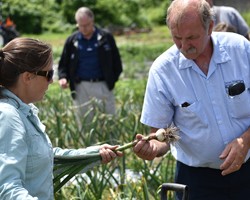2019 Garlic School: Fusarium Management, Eriophyid Mite Trial, Bloat Nematode
Christy Hoepting, Extension Vegetable Specialist
Cornell Vegetable Program

The 2019 Garlic School featured final results from a 2-year study which focused on understanding and managing Fusarium disease of garlic. CVP Specialists, Christy Hoepting and Robert Hadad participated in this project, along with Dr. Frank Hay, Plant Pathologist at AgriTech, and CCE Extension Vegetable Specialists, Crystal Stewart (ENYCHP) and Sandy Menasha (CCE Suffolk Co.).
Here is a brief description of each presentation. Full presentations can be downloaded at the bottom of the page.
Cultural Controls for Fusarium Management -- Crystal Stewart shared the results of the cultural practice study, which was repeated in 2017 and 2018, both in Eastern and Western New York. Treatments included porcelain vs. racombole types, raised vs. flat bed, black plastic, silver plastic, straw mulch and bare ground, fall vs. spring planted. Although none of these treatments had a strong effect on Fusarium diseases, white plastic resulted in the greatest proportion of jumbo-sized bulbs, while spring-planted garlic had the lowest yields.
2016-2018 Garlic Fusarium Trial Results (Part II): Nitrogen and Fungicides/Sanitizers -- Christy Hoepting shared the results of the effects of applied nitrogen, and the evaluation of fungicides and sanitizers on Fusarium diseases. These trials were repeated in 2017 and 2018 in Western NY (Batavia in 2017; Albion in 2018) and in Long Island. Nitrogen treatments included 50, 100 and 150 lb/A of applied inorganic nitrogen (single application in the spring). Sanitizer treatments included Oxidate/Terraclean seed dip and in-furrow treatments at planting, as well as a drench of Terraclean and Terragrow (biological package) over the row during the growing season. Fungicides included Maxim, Vibrance as well as the biological, Serifel. None of these treatments stood out as having much activity on Fusarium diseases of garlic. Interestingly, in 8 out of 8 side-by-sode comparisons, there was no difference in yield among 50, 100 and 150 lb/A of applied nitrogen. We also saw a slight increase in yield only when sanitizers were used with clean seed, and not when we used Fusarium-infested seed, or when we planted clean seed in soil that we artificially inoculated with Fusarium.
Diseases of Garlic -- Frank Hay described several diseases of garlic that occur in New York. As part of the Fusarium project, samples of Fusarium were sent to Frank from across the state. Although he found six different species of Fusarium, the two most common were F. oxysporum and F. proliferatium. The general impression upon the completion of the Garlic Fusarium Project was that Fusarium diseases of garlic appear to not to be a primary pathogen, rather they are following something else, such as injury caused by insects of abiotic factors. Other garlic diseases that Frank discussed included white rot, Botrytis, Alternaria embellisia, Anthraconose, Rhizopus and rust, as well as the newly discovered in New York, Eriophyid mite.
2018 Eriophyid Mite Control Trial Results -- Christy Hoepting shared results of an Eriophyid mite trial that she conducted using a severely infested seed lot in 2017-2018. Treatments included seed treatment, seed soak and foliar application of the miticide abamectin, seed soak with mineral oil + soap, hot water treatment and foliar application of Zeal. Seemingly clean cloves from the infested lot were included as a treatment along with clean seed from a clean lot. Key findings were emergence and germination of E. mite-infested seed was very poor and none of the treatments appeared to work. However, clean seed from the E. mite-infested had stands and yields that were statistically the same as clean seed.
Leek Moth Identification and Management Guide -- Crystal Stewart reviewed the leek moth handbook. Recent new reports of this pest include in Niagara County in Ontario, Canada. Thus, it is expected that the leek moth will show up soon in Western NY, if it is not here already.
Update on Bloat Nematode and Other Diseases of Garlic -- Robert Hadad reviewed a presentation on garlic bloat nematodes, as this pest continues to be a sporadic problem in garlic. Since growers have been making a concerted effort to not plant infested seed, this pest problem has lessened substantially since it first blew up in 2010.
Cultural Controls for Fusarium Management (pdf; 5036KB)
2016-2018 Fusarium Trial Results (Part II): Nitrogen and Fungicides/Sanitizers (pdf; 9190KB)
Diseases of Garlic (pdf; 6965KB)
2018 Eriophyid Mite Control Trial Results (pdf; 9327KB)
Leek Moth Identification and Management Guide (pdf; 4472KB)
Update on Bloat Nematode and Other Diseases of Garlic (pdf; 18990KB)


































